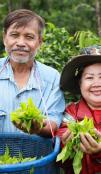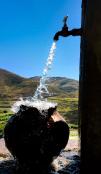My experience on SADC journalist study tour in Brussels, Belgium

By Thoboloko Ntšonyane
I was among the first cohort of Southern African Development Community (SADC) journalists to be selected for a study visit as part of the European Union Visitors Programme (EUVP). The programme invites political leaders, high-ranking government officials, human rights activists, academics and journalists to visit EU institutions. . I had an opportunity to engage with EU top officials, policymakers, and experts, to gain first-hand experience of the EU's decision-making processes and policies as well as networking with other international leaders on global issues such as democracy, human rights, and the rule of law.
I was the first Mosotho to be included in the programme last December in Brussels (Belgium) I remain indebted to the EU Delegation of Lesotho for selecting me.
I should state that it was my first tripto Europe and the visit was a valuable experience both on a professional and personal level- I made connections with colleagues from the region who took part in the study tour.
In this piece, I reflect on my learning experience at the EU institutions and how they have enhanced my reporting experience on EU matters.
The tour was quite an informative experience for me to learn first-hand how EU institutions function and about the EU relations with the AU, SADC and Lesotho.
The exclusion was really to capacitate journalists to report on the EU with enhanced understanding of the EU's interest and values - rule of law, human rights and international norms and standards.
The learning took place within a beautiful environment punctuated by insightful discussions and interactions with the esteemed EU officials.
The main takeaway for me was that the EU has moved from the development aid provider to Africa to now being a partner of Africa where there are mutual benefits for the bloc and the continent. This is manifested in its Strategic partnerships agreements with Africa, in particular the ambitious EU-Africa Global Gateway Investment Package where it is going to mobilise €150 billion to among others fund green projects; digital transition; accelerate sustainable growth and decent job creation; strengthen the health systems and invest in education and training.
In May last year at the signing of just over M600 million three Financing Agreements under the new EU's Multi-Annual Indicative Programme 2021-2027, EU Ambassador ‘m'e Paola Amadei stressed that EU's efforts are aligned with country’s national priorities and the objectives of Global Gateway, and in particular to support sustainable energy and water production and access.
We were taken on different days on a guided tour to the strategic EU institutions including the EU Parliament; EU Council; EU Commission and the European External Action Service (EEAS).
EU Parliament
I am delighted to mention that I am also accredited to cover this parliament.
We were given a tour of the EU parliament and I was struck by how journalists have work stations and library within the precinct of the parliament.
The EU Parliament has a strategic relationship with the Pan African Parliament. The former has over 700 members drawn from 27 Member States of the bloc, the latter has close to 250 members from 47 countries out of 55 African Union Member States.
In the Parliament, we also got to interact with MP Hon Carlos Zorrinho who is the Chairperson of the EU Delegation to ACP-EU Joint Parliamentary Assembly.
EU Council
This is where EU leaders convene and discuss issues of importance for the bloc. These leaders are Heads of State or Government of EU Member States.
They set the agenda for the EU's political agenda.
EU Commission
In the Commission this is where the EU's policies are carried out by the Commissioners as set out by the Commission President.
What particularly fascinated me at the Commission was the daily press briefing where different Commission Spokespersons communicate to the EU Member countries and the world the daily decisions reached at the Commission.
I must say the precision and clarity at which they communicate is highly commendable.
The EU builds partnerships with countries and organisations and central to its work are actions aimed at putting women and youth at the front to advance gender equality and ensuring access to better education.
EEAS
The EU External Action Service is the diplomatic service charged with carrying out EU's foreign and security policies.
This organ works closely with the EU Member States and the aforementioned institutions to advance the EU mission centred around the areas of peace, security and prosperity as well as on advancing Member States interests.
It also works closely with the United Nations and other multilateral organisations.





